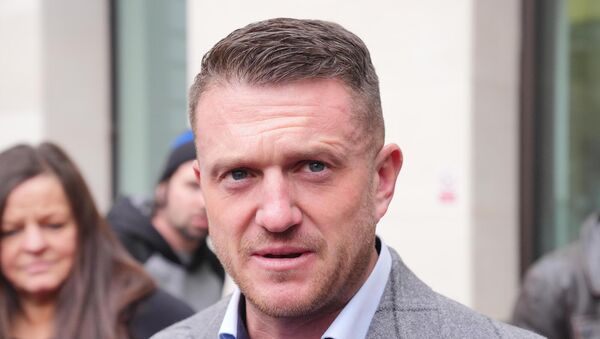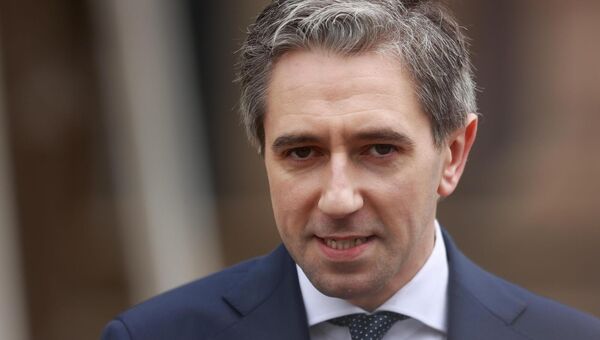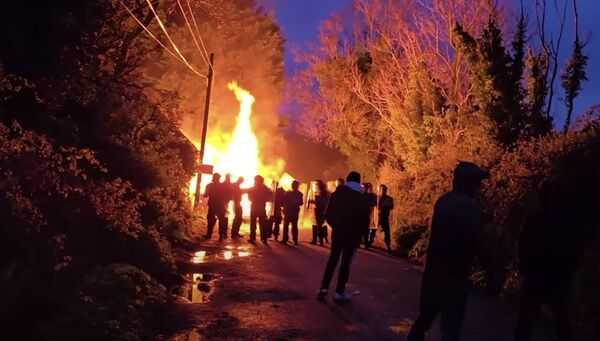Foreign actors are influencing more extreme protests on domestic scene
Videos of dark-clad riot-squad officers, armed with long shields and helmets, driving at lines of protestors, women among them, was a sign of ‘police brutality’ against ordinary people.
Those clips, and others taken by protestors, were uploaded and went viral for both believers and agnostics to see.
There were far fewer clips of what Garda HQ, garda representative bodies, and a range of Garda sources said was the violence that preceded it — of unprotected gardaí having stones and objects thrown at them, of garda vehicles being smashed up and an outhouse being set on fire.
But the far-right were not interested in that.
The gardaí were the new Black and Tans, the new RUC, they screamed online.
(There is no doubt a significant number of local people — the bulk with no involvement in far-right groups — protested the opening of Trudder House to accommodate immigrants.)
“The outsiders from Dublin did all the agitating, increasing the aggression,” a garda source said.
“They wanted a confrontation with us, and they got it.”
A separate garda source said: “It’s clear from what has been happening that dark forces are seeking to create division and conflict with authority.”
The events at the Co Wicklow village has attracted gleeful commentary from well-known far-right political figures in England, including Tommy Robinson and Nick Griffin — which seems incongruous given the frantic waving of the tricolour and videos and old photographs of 1916 and the Black and Tans.
Some garda sources claim a lot of the more extreme accounts are from people in the UK and the US.

The events at the Co Wicklow village has attracted gleeful commentary from well-known far-right political figures in England, including Tommy Robinson.
The events at the Co Wicklow village has attracted gleeful commentary from well-known far-right political figures in England, including Tommy Robinson.
These sources recall that, last September, prominent far-right agitators in the US urged “civil war” in Ireland after the Dublin riots, with powerful US figures, such as X owner Elon Musk saying the Irish prime minister “hates the Irish people” and agreeing with a far-right influencer who said sportsman and pub owner Conor McGregor should run for office.
As recruitment videos for far-right groups, Newtownmountkennedy was a bit of a propaganda coup — not just in terms of emboldening existing members and possibly attracting more, but also potentially securing votes for their candidates standing in the local and European Parliament elections on June 7.
They include the Irish Freedom Party, the National Party (split into two factions), Ireland First, and other new tiny parties and far-right independents.
Before now, these parties and individuals have not had any showing in the elections.
“We have been very slow as a country to respond to disinformation and misinformation and how this is helping the far-right,” an experienced garda source said.
Immigration is a major mainstream issue and has been dominating much of the news and the political agenda.
The latest imbroglio over asylum seekers using the open border with the North to travel from Britain to Ireland to claim asylum has deepened concerns among many voters — and not to the benefit of the mainstream parties.
As reported in the Irish Examiner last month a recent Eurobarometer poll found that migration and asylum were the second most important issue for Irish people in the European Parliament elections — compared to seventh for the average EU citizen.
The survey, conducted last February, showed that 42% of Irish people said it was the most pressing issue (after health at 46%), compared to just 24% for the average EU citizen.
A special report by the European Parliament last year spelled out the threat to Europe: “Foreign interference, disinformation and numerous attacks on and threats against democracy are expected to continue in ever-greater numbers and more sophisticated ways in the run-up to the European Parliament elections.”
Disinformation — deliberate, false information, typically used to foster division, fear and even hatred — is seen throughout Europe as something that could weaken democracy.
Disinformation decreases the ability of citizens to take informed decisions and to freely participate in democratic processes.
Last September, TikTok published the details of what it called a “covert influence operation” it conducted with Europol, the EU police agency.
In Ireland, they found 72 fake accounts which spammed its 94,000 followers with online content “with divisive views related to nationalism” to “intensity social conflict” in Ireland and other countries.
The European Parliament report said: “Foreign interference, including disinformation, is a national and cross-border security threat.”
Disinformation is spread domestically and from other countries, by individuals and groups or by a state — the latter described as Foreign Information Manipulation and Interference (Fimi).
A separate report, specifically on Fimi, was published by the EU External Action Service last January.
EU diplomatic chief and head of the service, Joseph Borrell said: “Fimi poses a major threat to liberal democracies, which rely on free and open information.
“Fimi is closely connected to both hybrid threats and cyber threats and has become a crucial component of modern-day warfare.”
“2024 is a critical year for democracy,” Mr Borrell said. “The battle against Fimi is a matter of European security.”
This report examined 750 Fimi incidents between December 2022 and November 2023 — twice the number in the previous year.
Some 149 different organisations were targeted, most frequently the EU and its member states.
The most used social media platforms were Telegram and X, with activity was also seen on Facebook, YouTube and TikTok.
To combat Fimi, the report urged governments, state bodies and security agencies to create “internal dedicated response teams” that would coordinate with each other.

Disinformation and cyberattacks represent the most imminent threats to upcoming elections in Europe. File picture: iStock
Disinformation and cyberattacks represent the most imminent threats to upcoming elections in Europe. File picture: iStock
A report last March by Hybrid CoE, an expert body that works with the EU and Nato, said: “Disinformation and cyberattacks, particularly those aimed at undermining public trust and compromising election infrastructure, represent the most imminent threats to upcoming elections in Europe.”
The European Parliament has direct experience of a cyberattack on November 23, 2022, which was claimed by a pro-Kremlin hacker group.
The European Parliament report said the attack shut down the parliament website “after a vote on a resolution to declare Russia a state sponsor of terrorism”.
It said Russia’s disinformation campaigns and cyberattacks stepped up before the full scale invasion of Ukraine in February 2022 and have continued since.
The report expressed concerns about “regular revelations of massive Russian funding of political parties and politicians” and said this “puts at risk the integrity of the democratic functioning” of EU member states.
The European Parliament report — conducted over 18 months — was overwhelmingly passed by a special committee, 27 to one.
The one was Irish MEP Clare Daly, on behalf of the Group of the Left.
In January, the European Parliament announced it was opening an investigation into a Latvian MEP over claims she was working with Russian intelligence.
Earlier this month, the Belgian federal prosecutor said it was investigating the findings of an investigation by Czech authorities that MEPs were receiving cash from a Russian-backed propaganda network.
Last February, French authorities unveiled the existence of a pro-Russian propaganda network, named “Portal Kombat”, that was pumping out stories online.
A key focus of Russian disinformation is to discredit Ukraine and sow internal divisions with Europe in a bid to reduce international military and political support for Ukraine.
In March, the US Department of Justice issued an indictment saying that Chinese hackers with links to China’s national spy agency targeted “every European Union member” of the parliament’s Inter-Parliamentary Alliance on China.

European Parliament vice president Dita Charanzova said the elections in June will be “a target for disinformation and cyber interference”. Picture: Getty Images
European Parliament vice president Dita Charanzova said the elections in June will be “a target for disinformation and cyber interference”. Picture: Getty Images
Two weeks ago, European Parliament vice president Dita Charanzova said the parliament “has rejected hundreds of cyberattacks, from Russia, China, and also North Korean and Iran”.
She said the elections in June will be “a target for disinformation and cyber interference”.
Senior security sources in Ireland have told the Irish Examiner that while interference by Russia is of concern, that there was no intelligence of such interference happening here.
The European Parliament report focused much of its attention on the social media companies.
“The business model of online platforms still relies on advertising based on personal data and opaque algorithms whereby more engagement translates into more advertising revenue, and that this engagement by algorithms that reward polarised and extreme opinions,” the report said.
It said social media platforms are “designed in a way that helps to amplify false and misleading narratives”.
The report said it regretted that platforms such as Meta (Facebook WhatsApp, Instagram), Google, YouTube, TikTok and Twitter (now X) were “still not doing enough to actively counter disinformation”.
It said the Code of Practice that the European Commission was devising under the Digital Services Act was not binding and that many platforms were not even signatories to it, pointing out that Telegram “does not cooperate at all”.
It said TikTok was a “potential risk and a source of Chinese-backed disinformation” and welcomed the decision by EU institutions to restrict the its use on corporate devices and recommended a ban at all levels of national governments.
Shortly after, the Irish National Cyber Security Centre (NCSC) advised the government against use of the app on official devices, in general, but not completely.
As is well known, Taoiseach Simon Harris is an avid user, though it is not clear if he uses an official or private phone or whether his use fits into exceptions provided for in the NCSC advice.
The European Commission has been given significant powers to tackle disinformation and online harm under the Digital Services Act (introduced in Ireland last February), particularly in relation to the top online multinationals.

Taoiseach Simon Harris is an avid TikTok user, though it is not clear if he uses an official or private phone or whether his use fits into exceptions provided for in the NCSC advice.
Taoiseach Simon Harris is an avid TikTok user, though it is not clear if he uses an official or private phone or whether his use fits into exceptions provided for in the NCSC advice.
Media regulator, Coimisiún na Meán (CnM), along with similar bodies abroad, works with the European Commission on tackling this issue at national levels.
Last week, the European Commission announced it has a number of investigations underway, including one against Meta’s platforms Facebook and Instagram for suspected infringement of the act, especially in relation to spreading online disinformation and deceptive advertisement.
Irish politicians, it’s fair to say, do not have much good to say about how the online giants are addressing disinformation.
At a recent Oireachtas committee hearing attended by CnM, Sinn Féin TD for Louth Ruairi Ó Murchu said social media platforms push “bile, hate and deranged lunacy”.
Hearing from CnM chair Jeremy Godfrey that they’ve had “good engagement” with the tech giants, Mr Ó Murchu said: “I’ve seen nothing changed. Basically social media is an absolute sewer.
“You’re going to have nothing but mistruths, disinformation and misinformation the whole way, right through the election.”
Committee chair, Colm Brophy, Fine Gael TD for Dublin South West, said there was a “vile element” online who were targeting and threatening “the most vulnerable in society – immigrants – coming into the country”.
He said in his experience the social media companies sound good, but act differently.
“Election security is a very confused space,” one senior security source told the Irish Examiner. “There are so many players but no overall coordination.”
As far back as January 2016 an Oireachtas committee recommended the establishment of an Electoral Commission.
In December 2017 the Government set up an Interdepartmental Group on Security of Ireland’s Electoral Process and Disinformation.
It was chaired by the Department of Taoiseach and included the relevant departments, as well as the Defence Forces and An Garda Síochána.
Its June 2018 report found that while the overall risk to the electoral process was relatively low there was a “more substantial risk” from disinformation online and cyberattacks on the electoral system.
A progress report, in November 2019, said the establishment of the Electoral Commission was “in progress” and that the deadline was autumn 2020.
However, it wasn’t until February 2023 before the Electoral Commission was actually established — some seven years after being recommended.

Screengrab from video posted on Twitter following a clash with protesters and gardaí as a premises in Newtownmountkennedy is set ablaze. Source: Twitter
Screengrab from video posted on Twitter following a clash with protesters and gardaí as a premises in Newtownmountkennedy is set ablaze. Source: Twitter
An Coimisiún Toghcháin has powerful laws under 2022 legislation to direct social media companies to take down posts on disinformation and misinformation that could cause public harm in relation to the electoral process and to properly label political advertising.
But these legal powers have not yet been commenced by the Government as it is waiting for the green light from the European Commission.
The same is the case with CnM in relation to its wider powers on tackling disinformation and online harm.
For now both agencies are using their informal ‘encouragement’ power to get social medias to put the public good before their profits.
Security services are reluctant to get involved in activity that interferes with freedom of expression, citing strong constitutional and European rights.
But security sources do agree on the need for an overall disinformation strategy and coordinating body.
A working group was set up by the Department of the Arts in February 2023, with representatives from government departments, public bodies, industry, academia and civil society.
In a peculiar omission — and in contrast to the 2017 group on disinformation — neither An Garda Síochána nor the Defence Forces were included.
Nor was the National Security Analysis Centre (NSAC), a coordinating intelligence unit within the Department of the Taoiseach. (Efforts to get comment from NSAC for this report were unsuccessful.)
The National Counter Disinformation Strategy Working Group published a scoping paper in September 2023.
The paper said that given the wide-ranging nature of disinformation, a “whole-of-government approach will be required” which would require a “significant capacity for coordination”.
The strategy was supposed to be published before March this year, but the department said that it will now happen before June.
Any coordination structures proposed won’t be established until later — and whether it will be operational before the general election is unclear.
In the meantime domestic and foreign disinformation continues apace.
Many might think the latter is not a real problem for Ireland, but recent investigations reveal just how far Russia is going.
Just a week ago, the European Digital Media Observatory (EDMO) reported the pro-Russian “Portal Kombat” network had expanded since French authorities exposed it back in February.
EDMO investigations at the end of March found that the network, also known as Pravda, had now spread to 19 EU countries, including in Ireland — and even had a website in Irish.
But sources point out the bigger danger comes from within ‘friendly’ states, like the US and the UK.
The scale of the international involvement in fuelling anti-immigration posts was highlighted last week by the Sky News Data & Forensics Unit, which found that 56% of the posts on X regarding Newtownmountkennedy, formerly Twitter, originated from the US.
Just over 20% were from Ireland and 10% from the UK.
It found that the most popular posts were from US conspiracy theorist Alex Jones and English far-right figure Tommy Robinson.
Would you like a lunchtime summary of content highlights on the Irish Examiner website? Delivered straight to your inbox at 1pm each day.
